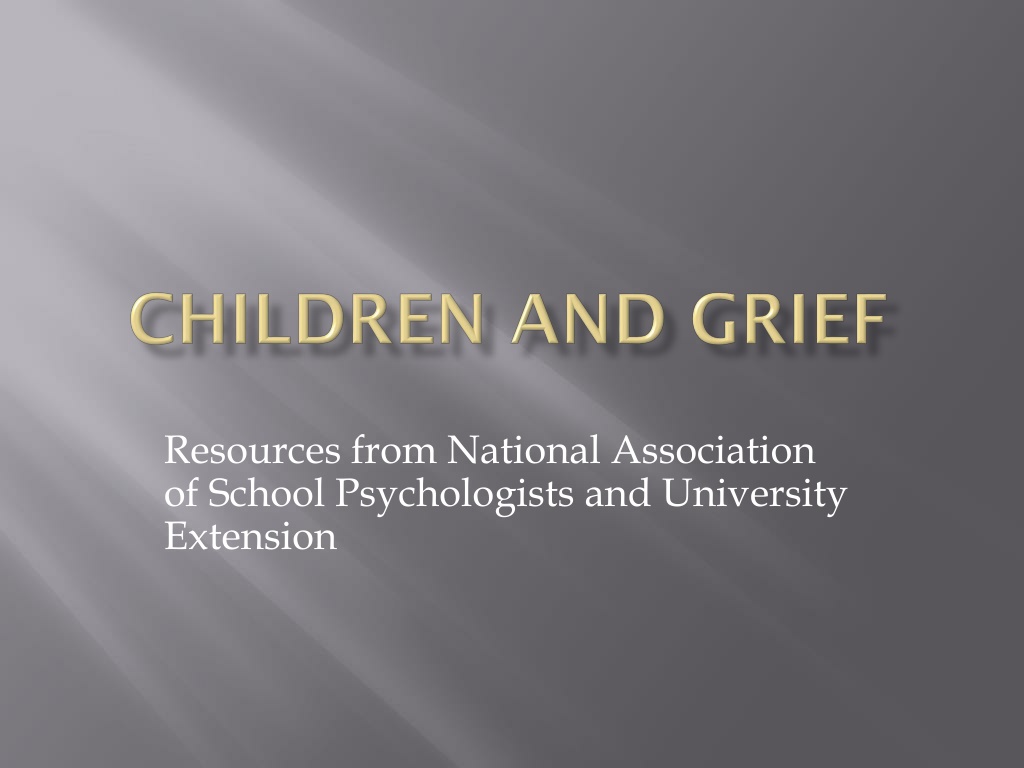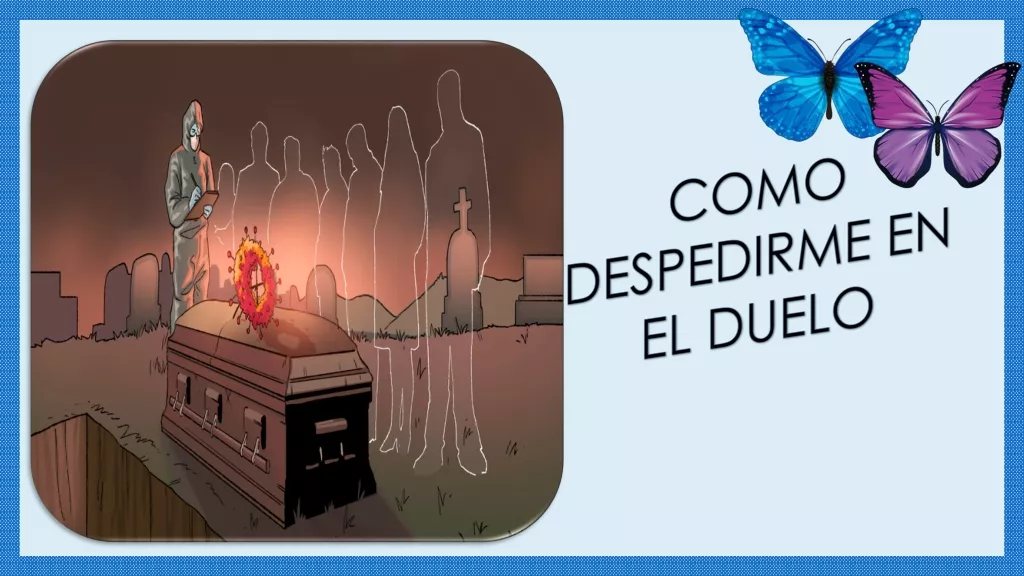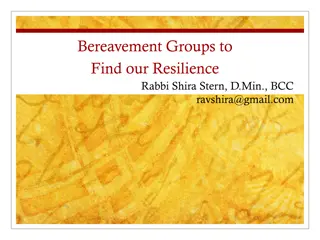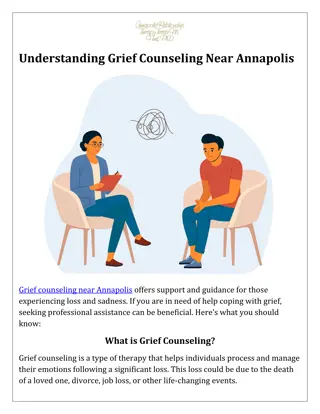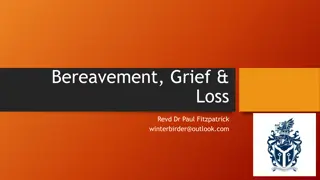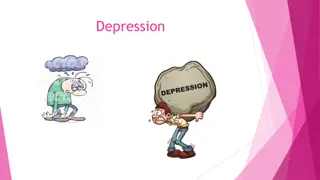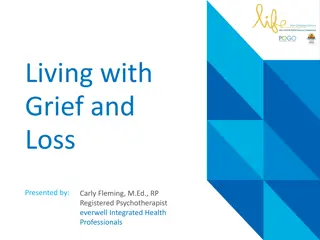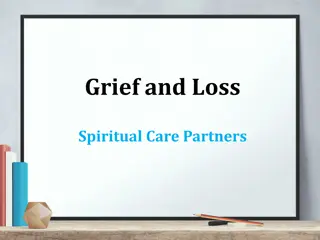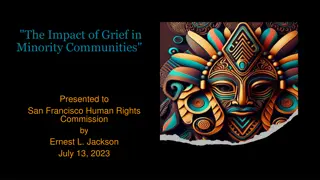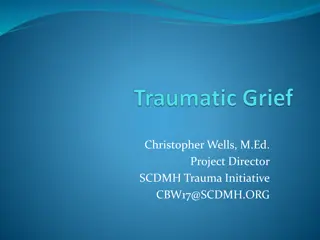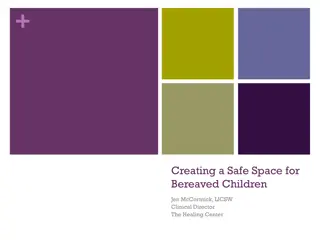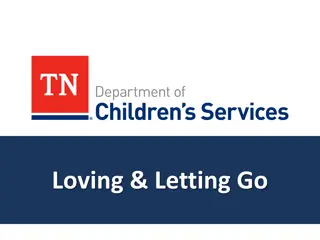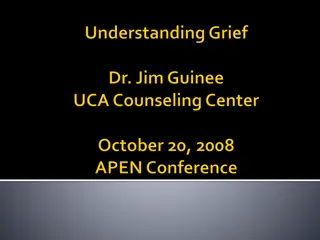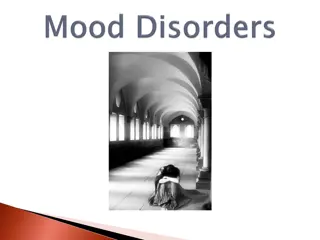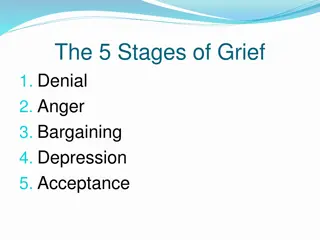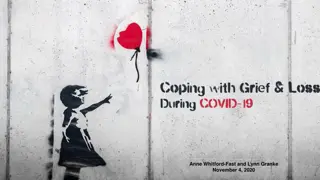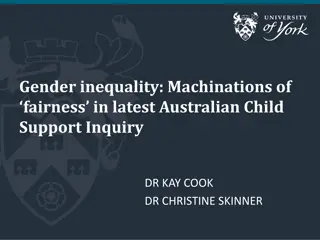Child Grief Responses and Support Strategies
This resource provides insights into children's grief responses to various life events such as death, separation, and natural disasters. It explains how different age groups perceive and cope with loss and offers practical strategies for supporting children through these challenging times.
Download Presentation

Please find below an Image/Link to download the presentation.
The content on the website is provided AS IS for your information and personal use only. It may not be sold, licensed, or shared on other websites without obtaining consent from the author.If you encounter any issues during the download, it is possible that the publisher has removed the file from their server.
You are allowed to download the files provided on this website for personal or commercial use, subject to the condition that they are used lawfully. All files are the property of their respective owners.
The content on the website is provided AS IS for your information and personal use only. It may not be sold, licensed, or shared on other websites without obtaining consent from the author.
E N D
Presentation Transcript
Resources from National Association of School Psychologists and University Extension
Permanent (death) Family, friends, other loved ones Pets Unknown Separation/divorce Military deployment Natural disaster Relocation
You represent someone they trust You can convey to them that it is ok for them to feel the way they do (they will pick up on your cues ) You represent someplace safe that they are familiar with
Age Child s Grief Response May not understand death, but know something has changed someone is not longer around; sensitive to stress expressed by adults around them; know their routine has been disrupted Infants and toddlers may not act sad, but it doesn t mean they don t care they just are not able to express emotions the same as older children What You Can Do Keep their routine at child care as normal as possible-- especially eating and sleeping; if possible keep them with the same staff member; be alert to their cues that they need comfort Keep explanations simple Infants and Toddlers (age 2 and younger)
Age Child s Grief Response Have a basic understanding of death but still may not fully get that it is permanent; May ask lots of questions, some may seem inappropriate, but it is because of their level of understanding; they may think they caused it in some way What You Can Do Remember that they may not realize these changes are long lasting and permanent you may have to repeat answers often; be sensitive but truthful (death is not sleeping they ll think the dead person will wake up, or they ll think if they go to sleep they ll die). Preschool (age 3-5)
Age Child s Grief Response They being to know basic facts about death: - --It is permanent --It can t be undone --life functions stop when a person dies --all living things will eventually die What You Can Do Encourage them to talk about fears and worries Reassure them that their feelings are normal Help them identify ways that they can be healthy and safe Young school age (6-8) They may become afraid of dying and talk about their own death
Age Child s Grief Response Are able to understand that death is final; but may not differentiate what they see on TV (war images, disasters, plane crashes) and what could happen to them in their own neighborhood What You Can Do Don t lie or tell half truths to explain events; give them time and encouragement to sort out their feelings Middle school age 8 - 12
Emotional shock and at times an apparent lack of feelings, which serve to help the child detach from the pain of the moment; Regressive (immature) behaviors, such as needing to be rocked or held, difficulty separating from parents or significant others, needing to sleep in parent s bed or an apparent difficulty completing tasks well within the child s ability level; Explosive emotions and acting out behavior that reflect the child s internal feelings of anger, terror, frustration and helplessness. Acting out may reflect insecurity and a way to seek control over a situation for which they have little or no control; Asking the same questions over and over, not because they do not understand the facts, but rather because the information is so hard to believe or accept. Repeated questions can help listeners determine if the child is responding to misinformation or the real trauma of the event. Source: National Association of School Psychologists
Be a good listener Grief is a process, not an event (it takes time) Encourage them to express their feelings/ask questions The significance of the loss will affect the length of time they ll need to work through the process Grief is not predictable nor is there one correct way to grieve Source: National Association of School Psychologists
Seeing a friend try to cope with a loss may scare or upset children who have had little or no experience with death and grieving. Following are some suggestions teachers and parents can provide to children and youth to deal with this secondary loss. Source: National Association of School Psychologists
Seeing their classmates reactions to loss may bring about some fears of losing their own parents or siblings, particularly for students who have family in the military or other risk related professions. Children need reassurance from caregivers and teachers that their own families are safe. For children who have experienced their own loss (previous death of a parent, grandparent, sibling), observing the grief of a friend can bring back painful memories. These children are at greater risk for developing more serious stress reactions and should be given extra support as needed. Source: National Association of School Psychologists
Children (and many adults) need help in communicating condolence or comfort messages. Provide children with age- appropriate guidance for supporting their peers. Help them decide what to say (e.g., Steve, I am so sorry about your father. I know you will miss him very much. Let me know if I can help you with your paper route . ) and what to expect. Source: National Association of School Psychologists
Help children anticipate some changes in friends behavior. It is important that children understand that their grieving friends may act differently, may withdraw from their friends for a while, might seem angry or very sad, etc., but that this does not mean a lasting change in their relationship. Source: National Association of School Psychologists
Explain to children that their regular friendship may be an important source of support for friends and classmates. Even normal social activities such as inviting a friend over to play, going to the park, playing sports, watching a movie, or a trip to the mall may offer a much needed distraction and sense of connection and normalcy. Source: National Association of School Psychologists
Children need to have some options for providing support it will help them deal with their fears and concerns if they have some concrete actions that they can take to help. Suggest making cards, drawings, helping with chores or homework, etc. Older teens might offer to help the family with some shopping, cleaning, errands, etc., or with babysitting for younger children. Source: National Association of School Psychologists
Encourage children who are worried about a friend to talk to a caring adult. This can help alleviate their own concern or potential sense of responsibility for making their friend feel better. Children may also share important information about a friend who is at risk of more serious grief reactions. Source: National Association of School Psychologists
Parents and teachers need to be alert to children in their care who may be reacting to a friend s loss of a loved one. These children will need some extra support to help them deal with the sense of frustration and helplessness that many people are feeling at this time. Source: National Association of School Psychologists
http://www.nasponline.org/resources/crisis_ safety/griefwar.pdf http://missourifamilies.org/features/parentin garticles/parenting44.htm http://www.extension.org/pages/59556/way s-child-care-providers-can-help-children-deal- with-grief-and-loss
http://www.apa.org/topics/violence/school- shooting.aspx http://www.helpguide.org/mental/grief_loss. htm http://health.mo.gov/living/lpha/volunteertr aining/Tips_for_Survivors_of_a_Traumatic_Ev ent.pdf
